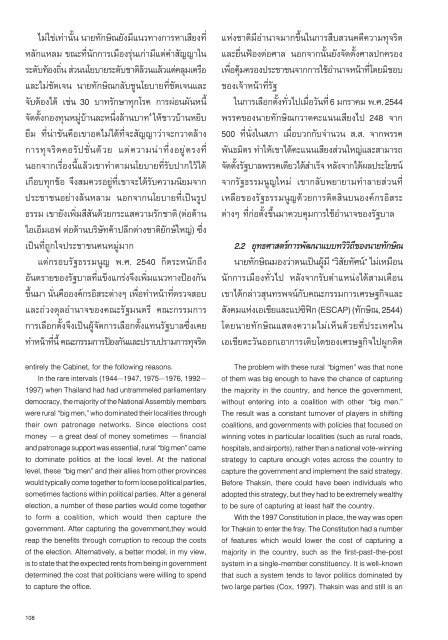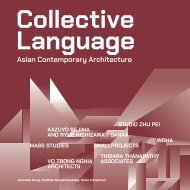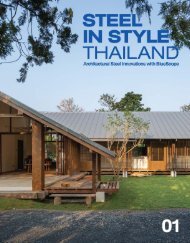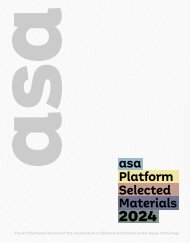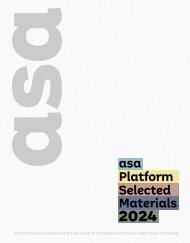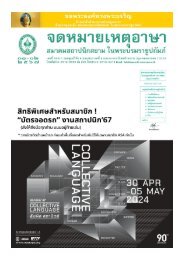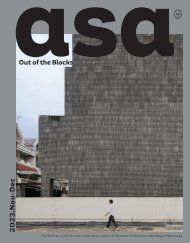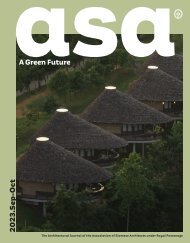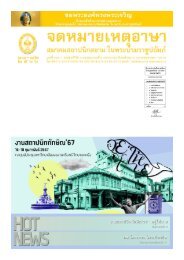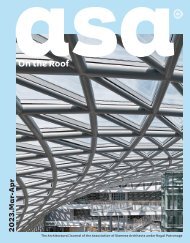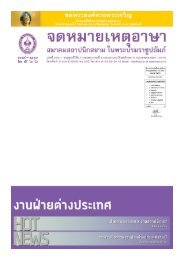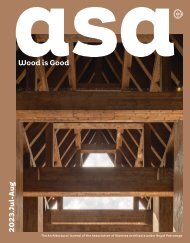บ้านเรือนถิ่นไทยในช่วงเจ็ดทศวรรษ 2489-2559
Create successful ePaper yourself
Turn your PDF publications into a flip-book with our unique Google optimized e-Paper software.
ไม่ใช่เท่านั้น นายทักษิณยังมีแนวทางการหาเสียงที่<br />
หลักแหลม ขณะที่นักการเมืองรุ่นเก่ามีแต่คำสัญญาใน<br />
ระดับท้องถิ่น ส่วนนโยบายระดับชาติล้วนแล้วแต่คลุมเครือ<br />
และไม่ชัดเจน นายทักษิณกลับชูนโยบายที่ชัดเจนและ<br />
จับต้องได้ เช่น 30 บาทรักษาทุกโรค การผ่อนผันหนี้<br />
จัดตั้งกองทุนหมู่บ้านละหนึ่งล้านบาท 4 ให้ชาวบ้านหยิบ<br />
ยืม ที่น่าขันคือเขาอดไม่ได้ที่จะสัญญาว่าจะกวาดล้าง<br />
การทุจริตคอรัปชั่นด้วย แต่ความน่าทึ่งอยู่ตรงที่<br />
นอกจากเรื่องนี้แล้วเขาทำตามนโยบายที่รับปากไว้ได้<br />
เกือบทุกข้อ จึงสมควรอยู่ที่เขาจะได้รับความนิยมจาก<br />
ประชาชนอย่างล้นหลาม นอกจากนโยบายที่เป็นรูป<br />
ธรรม เขายังเพิ่มสีสันด้วยกระแสความรักชาติ (ต่อต้าน<br />
ไอเอ็มเอฟ ต่อต้านบริษัทค้าปลีกต่างชาติยักษ์ใหญ่) ซึ่ง<br />
เป็นที่ถูกใจประชาชนคนหมู่มาก<br />
แต่กรอบรัฐธรรมนูญ พ.ศ. 2540 ก็ตระหนักถึง<br />
อันตรายของรัฐบาลที่แข็งแกร่งจึงเพิ่มแนวทางป้องกัน<br />
ขึ้นมา นั่นคือองค์กรอิสระต่างๆ เพื่อทำหน้าที่ตรวจสอบ<br />
และถ่วงดุลอำนาจของคณะรัฐมนตรี คณะกรรมการ<br />
การเลือกตั้งจึงเป็นผู้จัดการเลือกตั้งแทนรัฐบาลซึ่งเคย<br />
ทำหน้าที่นี้ คณะกรรมการป้องกันและปราบปรามการทุจริต<br />
entirely the Cabinet, for the following reasons.<br />
In the rare intervals (1944–1947, 1975–1976, 1992–<br />
1997) when Thailand had had untrammeled parliamentary<br />
democracy, the majority of the National Assembly members<br />
were rural “big men,” who dominated their localities through<br />
their own patronage networks. Since elections cost<br />
money – a great deal of money sometimes – financial<br />
and patronage support was essential, rural “big men” came<br />
to dominate politics at the local level. At the national<br />
level, these “big men” and their allies from other provinces<br />
would typically come together to form loose political parties,<br />
sometimes factions within political parties. After a general<br />
election, a number of these parties would come together<br />
to form a coalition, which would then capture the<br />
government. After capturing the government,they would<br />
reap the benefits through corruption to recoup the costs<br />
of the election. Alternatively, a better model, in my view,<br />
is to state that the expected rents from being in government<br />
determined the cost that politicians were willing to spend<br />
to capture the office.<br />
แห่งชาติมีอำนาจมากขึ้นในการสืบสวนคดีความทุจริต<br />
และยื่นฟ้องต่อศาล นอกจากนั้นยังจัดตั้งศาลปกครอง<br />
เพื่อคุ้มครองประชาชนจากการใช้อ ำนาจหน้าที่โดยมิชอบ<br />
ของเจ้าหน้าที่รัฐ<br />
ในการเลือกตั้งทั่วไปเมื่อวันที่ 6 มกราคม พ.ศ. 2544<br />
พรรคของนายทักษิณกวาดคะแนนเสียงไป 248 จาก<br />
500 ที่นั่งในสภา เมื่อบวกกับจำนวน ส.ส. จากพรรค<br />
พันธมิตร ทำให้เขาได้คะแนนเสียงส่วนใหญ่และสามารถ<br />
จัดตั้งรัฐบาลพรรคเดียวได้สำเร็จ หลังจากได้ผลประโยชน์<br />
จากรัฐธรรมนูญใหม่ เขากลับพยายามทำลายส่วนที่<br />
เหลือของรัฐธรรมนูญด้วยการติดสินบนองค์กรอิสระ<br />
ต่างๆ ที่ก่อตั้งขึ้นมาควบคุมการใช้อำนาจของรัฐบาล<br />
2.2 ยุทธศาสตร์การพัฒนาแบบทวิวิถีของนายทักษิณ<br />
นายทักษิณมองว่าตนเป็นผู้มี “วิสัยทัศน์” ไม่เหมือน<br />
นักการเมืองทั่วไป หลังจากรับตำแหน่งได้สามเดือน<br />
เขาได้กล่าวสุนทรพจน์กับคณะกรรมการเศรษฐกิจและ<br />
สังคมแห่งเอเชียและแปซิฟิก (ESCAP) (ทักษิณ, 2544)<br />
โดยนายทักษิณแสดงความไม่เห็นด้วยที่ประเทศใน<br />
เอเชียตะวันออกเอาการเติบโตของเศรษฐกิจไปผูกติด<br />
The problem with these rural “bigmen” was that none<br />
of them was big enough to have the chance of capturing<br />
the majority in the country, and hence the government,<br />
without entering into a coalition with other “big men.”<br />
The result was a constant turnover of players in shifting<br />
coalitions, and governments with policies that focused on<br />
winning votes in particular localities (such as rural roads,<br />
hospitals, and airports), rather than a national vote-winning<br />
strategy to capture enough votes across the country to<br />
capture the government and implement the said strategy.<br />
Before Thaksin, there could have been individuals who<br />
adopted this strategy, but they had to be extremely wealthy<br />
to be sure of capturing at least half the country.<br />
With the 1997 Constitution in place, the way was open<br />
for Thaksin to enter the fray. The Constitution had a number<br />
of features which would lower the cost of capturing a<br />
majority in the country, such as the first-past-the-post<br />
system in a single-member constituency. It is well-known<br />
that such a system tends to favor politics dominated by<br />
two large parties (Cox, 1997). Thaksin was and still is an<br />
108


